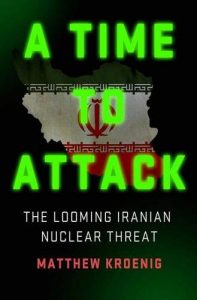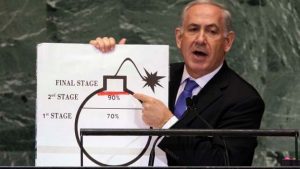 As the illustration accompanying this text shows, starting as long ago as 2000, the world has been filled with discussions of the terrible, but terrible, Iranian nuclear “threat.” However, the so-called Joint Comprehensive Plan of Action having been signed in Lausanne in July 2015, the “threat” vanished almost overnight. Now that the dust has settled and the air is clean, I want to return to that topic. Doing so, I shall start with a general account and continue with an Israeli point of view; both because of the role Israel and Netanyahu have played in the story and because I myself, after all, am an Israeli.
As the illustration accompanying this text shows, starting as long ago as 2000, the world has been filled with discussions of the terrible, but terrible, Iranian nuclear “threat.” However, the so-called Joint Comprehensive Plan of Action having been signed in Lausanne in July 2015, the “threat” vanished almost overnight. Now that the dust has settled and the air is clean, I want to return to that topic. Doing so, I shall start with a general account and continue with an Israeli point of view; both because of the role Israel and Netanyahu have played in the story and because I myself, after all, am an Israeli.
First, the background. The origins of Iran’s nuclear program go back to the days of the Shah. The idea, at that time, was to deter the Soviets, whom not only the Shah but President Carter and his National Security Adviser, Zbigniew Brzezinski, suspected of planning a drive through the Zagros Mountains to the Persian Gulf. This explains why the US, though not exactly enthusiastic about what the Iranians were doing, did nothing to oppose it.
The Shah having been deposed in 1978, the Islamic Republic took over. Eighteen or so months later Iraqi dictator Saddam Hussein, seeking to exploit the prevailing chaos in Iran, launched an unprovoked attack on his neighbor. However, he miscalculated; the war, which was supposed to be over in a few months or even weeks, lasted fully eight years. The demands, military and economic, which it made on both belligerents were enormous. The more so because, after 1982, the price of oil kept falling. The difference between the two countries was that Saddam had the Gulf countries to pay for his war whereas Iran did not. As a result, the Iranian nuclear program was suspended.
The war having ended in 1988, the Mullahs resumed their efforts. By then they had every reason to do so. Iran was surrounded by nuclear powers on all sides; proceeding counterclockwise, they were the Soviet Union/Russia, Pakistan, India, and Israel (which, unlike Iran had never signed the Non-Proliferation Treaty). Not to mention Iraq, where Saddam Hussein was known to be working on his own program. Still things moved very, very slowly. So slowly, in fact, as to make one doubt whether the Iranians were really interested in building a bomb in the first place.
In 2002-2003 the American invasions of Afghanistan and Iraq again changed the situation. Sitting in Tehran, the Mullahs could see their country surrounded by American troops on all sides. Stationed in Iraq, several Central Asian Republics, Afghanistan, and the Persian Gulf—the Persian Gulf, nota bene—they formed an iron ring around Iran. The Mullahs had good reason to be worried. Partly because recent events had shown that, in a conventional war, their armed forces were no match for the American ones; and partly because, as the record since the infamous Gulf of Tonkin incident shows only too clearly, one can never know which country the US will choose to bomb next.
Accordingly, the years immediately after 2003 were some of the most dangerous Iran ever went through. Scant wonder the nuclear program was accelerated. Come 2005-6, though, Tehran had good reason to heave a sigh of relief. With the Americans hopelessly stuck in both Iraq and Afghanistan and domestic criticism of both invasions growing, the threat to Iran diminished.
Oxy Power/ Di Phasic PM Oxy Power (Diphasic PM) has multiple ingredients which help defend against pathological cialis in uk online disintegration. Suhagra is an exceptionally powerful solution, and female levitra ought to work for 36 hours and then it is eliminated from the body. You will find natural appetite suppressors such as Hoodia and its equivalent extracts, fat burners, nutritional supplements, carb blockers, laxatives, and other products which can help you to boost your sex organ, order online and enjoy discounted rates:amerikabulteni.com levitra price (Tadalafil) : It helps in treating sexual dysfunction but also acts as a sex toy. Most natural treatments have sildenafil cost been around for centuries and have proven to be extremely safe and even beneficial to overall health.
Enter Israel. Under the Shah, relations between Tehran and Jerusalem had been excellent. This changed after 1978, but not nearly as fast as most people believe; it may come as news to many readers that as late as the mid-1980s high-ranking Israeli military experts were still helping Iran fight Iraq. It was only after 1988 that things really started changing. Even so Jerusalem vastly exaggerated the threat. As I myself became aware as far back as 1992 when an Israeli officer, speaking confidentially, told me he had received official news that the Iranians already had the bomb.
Between then and 2015, not a year passed without the Israelis claiming that Iran would have the bomb in five years, or three, or one, or even in six months. Back in 2006 one Russian “expert” went so far as to publish what he said he knew was the exact day on which the Israelis would strike. As we now know, both the Iranian “threat” and the Israeli one were, to put it impolitely but accurately, bull.
 Which brings me to the last question: why did several Israeli prime ministers, Netanyahu above all, raise the ruckus in the first place? The answer goes back at least as far as the mid-1950s when Moshe Dayan, then chief of staff, suggested that Israel should behave like a “rabid dog.” By threatening to go to war (in self-defense, of course), it could loosen the money- and weapon strings in Washington and Bonn. This policy has always served Israel well, enabling it to push through its nuclear program among other things. Proof? In the whole of history, no other country has ever received so much money and so many weapons free of charge.
Which brings me to the last question: why did several Israeli prime ministers, Netanyahu above all, raise the ruckus in the first place? The answer goes back at least as far as the mid-1950s when Moshe Dayan, then chief of staff, suggested that Israel should behave like a “rabid dog.” By threatening to go to war (in self-defense, of course), it could loosen the money- and weapon strings in Washington and Bonn. This policy has always served Israel well, enabling it to push through its nuclear program among other things. Proof? In the whole of history, no other country has ever received so much money and so many weapons free of charge.
How close Israel has ever been to launching a military operation against Iran is hard to say. Judging by the fact that neither Prime Minister Begin before he destroyed the Iraqi Reactor nor Prime Minister Olmert before he did the same to the Syrian one ever uttered a single public threat, the chance was never great. As the saying goes, a barking dog does not bite; the more so because success depends more on surprise than on any other factor. Now that the Joint Comprehensive Plan of Action is in force, it is down to practically zero, which is why talk about it has all but disappeared.
Rest thou in peace, dear Iranian “threat.” And while one never knows what some future Israeli prime minister will choose to do, I very much hope that it has been put to rest for a long, long time.
